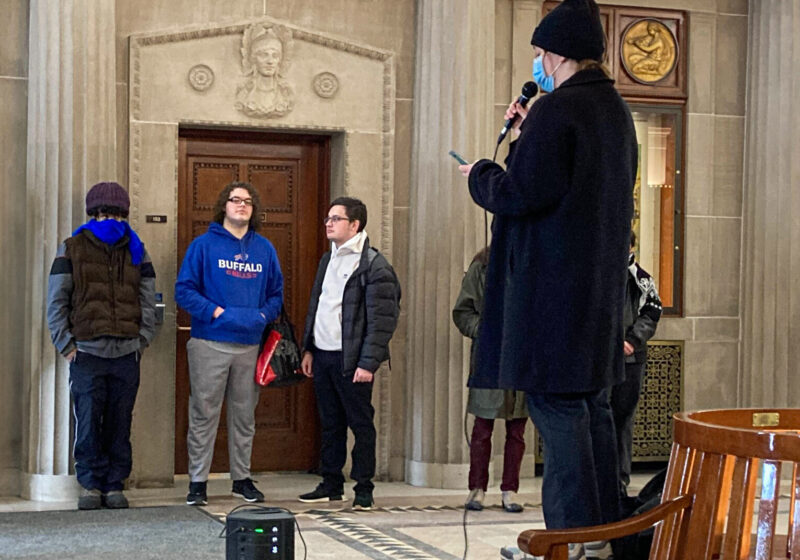“The End of the Tour,” based on David Lipsky’s book “Although of Course You End Up Becoming Yourself: A Road Trip with David Foster Wallace,” illustrates Lipsky’s experience interviewing David Foster Wallace while on a five-day book tour for Wallace’s colossal, footnote-filled novel, “Infinite Jest.”
The film begins with Lipsky in 2008, when he receives the news of Wallace’s suicide. The majority of the film is then a flashback to 12 years prior: Lipsky is a thirty-year-old novelist and writer for Rolling Stone who is approaching the tour as not only a job, but a chance to come face-to-face with someone he idolizes.
Jesse Eisenberg, who plays Lipsky, delivers a realistic, nuanced performance as someone who, with all of the gray area of real life, is hard to like, but redeemable in his intentions. The bond that forms between the two men is endearing until we are jarred by a shot of a tape recorder, or a question that brings us into Lipsky’s perspective as a career journalist who needs “the story” (when Lipsky asks about Wallace’s suicide watch or rumors of heroin addiction, to name a few). We lose track of what is genuine, and what is the interview.
“The End of the Tour” addresses, through Wallace’s reflection of his own work, what it is to be “American,” and how so-called “average” life can become, for some, unbearable.
“I think if the book is about anything, it’s about ‘why?’ Why am I doing it, and what is so American about what I’m doing?” Wallace , portrayed by Jason Segel, says in the film. “I think that if there’s a sort of sadness for people under 45, it has something to do with pleasure, and achievement, and entertainment. Like a sort of emptiness at the heart of what they thought was going on.”
Each scene is largely consumed by the analytical, introspective and self-aware dialogue of Wallace as he interacts with a person who he considers to be a great danger to his control—Lipsky has the power to represent Wallace in whatever way he wishes, and what Wallace wants is not to be represented at all (which makes the fact that there is a movie about him problematic).
What really makes the film unique, though, is how relatable these self-aware diatribes are. For any of us who have ever second-guessed a text message, over-edited a Facebook profile or felt like everyone was watching us when walking across campus, Wallace’s concerns are not far from home.
Segel’s ability to act the sensitive, out-there kind of guy fits Wallace’s insecurities and sense of isolation. Likewise, Eisenburg successfully plays the smart, ambitious and sometimes off-putting young Lipsky.
Although it isn’t necessary to have read any Wallace before seeing “The End of the Tour,” it helps to be aware of the thematic consistencies of his writing. Part of the beauty of the film is the simulated encounter with this illusive man; it was J.D. Salinger who wrote, “What really knocks me out is a book that, when you’re all done reading it, you wish the author that wrote it was a terrific friend of yours and you could call him up on the phone whenever you felt like it.”
The film makes the argument that to read Wallace’s writing, or anyone’s, for that matter, is to be stuck inside their head. Part of the consolation of “The End of the Tour” is the feeling that maybe, through Lipsky’s memoir, we are looking back into the less-fictional materialization of Wallace’s mind.
McAdams is a member of the class of 2017.



